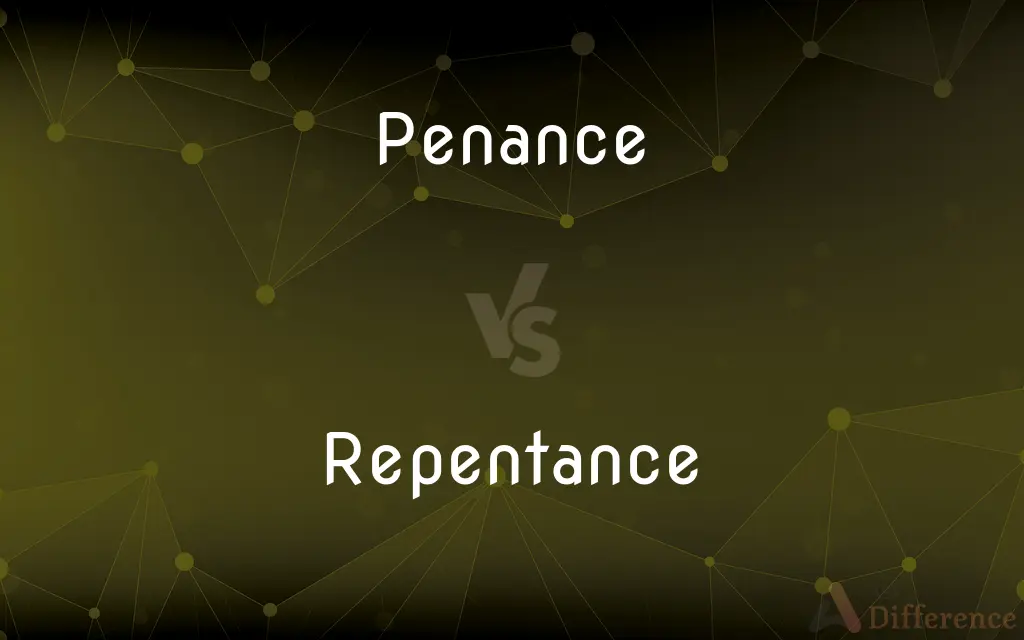Penance vs. Repentance — What's the Difference?
By Tayyaba Rehman — Published on October 25, 2023
Penance refers to an act of self-punishment or devotion to show remorse; Repentance is sincere regret or remorse about one's wrongdoing.

Difference Between Penance and Repentance
Table of Contents
ADVERTISEMENT
Key Differences
Penance is a religious or spiritual practice where an individual performs a particular action to show remorse for their sins or wrongdoing. This act can range from self-imposed punishment to certain rituals or behaviors. Repentance, on the other hand, is the genuine feeling of sorrow or regret for wrongdoing. It's an inner change, a heartfelt realization of guilt, and a desire to make things right.
While Penance focuses more on external actions or rituals to atone for sins, Repentance centers on an internal change of heart. For many, Penance can be a physical manifestation of the emotional and internal process of Repentance. Yet, it's possible for one to undergo Penance without genuine Repentance.
Penance often involves specific rituals in various religious traditions. For instance, in the Catholic tradition, Penance might involve saying certain prayers, fasting, or other forms of self-denial. Repentance doesn't require any specific action but is rather an internal acknowledgment and remorse over one's actions.
In summary, while both Penance and Repentance deal with remorse and atonement for wrongdoing, Penance emphasizes the outward actions to express remorse, and Repentance underscores the internal acknowledgment and desire for change.
Comparison Chart
Nature
External act or ritual
Internal feeling
ADVERTISEMENT
Focus
Atonement through actions
Sincere regret and desire for change
Religious Association
Often tied to specific religious practices
Universal concept across various religions
Requirement
Can be mandatory in certain religious settings
Voluntary feeling of remorse
Expression
Demonstrative, often visible
Personal, internal, might not always manifest externally
Compare with Definitions
Penance
Penance is a self-imposed punishment for one's wrongdoing.
As Penance for his actions, he fasted for three days.
Repentance
Repentance is genuine remorse for one's misdeeds.
His Repentance was evident in his heartfelt apology.
Penance
Penance is an act to express remorse for sins.
The priest assigned prayers as Penance.
Repentance
Repentance signifies a change of heart after wrongdoing.
His Repentance was evident when he rectified his past mistakes.
Penance
Penance involves rituals or actions to atone for sins.
He performed Penance by volunteering at the shelter.
Repentance
Repentance involves a sincere desire to change.
After much reflection, her Repentance led her to reconnect with those she hurt.
Penance
Penance signifies religious or spiritual atonement practices.
Penance in many cultures involves acts of charity.
Repentance
Repentance is an internal acknowledgment of guilt.
True Repentance is felt deep within the heart.
Penance
Penance denotes outward acts showing remorse.
Her Penance involved a pilgrimage to the holy site.
Repentance
Repentance is the regret felt for sins or errors.
Through Repentance, he sought a better path forward.
Penance
An act of self-mortification or devotion performed voluntarily to show sorrow for a sin or other wrongdoing.
Repentance
The act or process of repenting.
Penance
Penance A sacrament in some Christian churches that includes contrition, confession to a priest, acceptance of punishment, and absolution. Also called reconciliation.
Repentance
Remorse or contrition for past conduct or sin.
Penance
To impose penance upon.
Repentance
The condition of being penitent.
Penance
A voluntary self-imposed punishment for a sinful act or wrongdoing. It may be intended to serve as reparation for the act.
Repentance
A feeling of regret or remorse for doing wrong or sinning.
Penance
A sacrament in some Christian churches.
Repentance
The act of repenting, or the state of being penitent; sorrow for what one has done or omitted to do; especially, contrition for sin.
Godly sorrow worketh repentance to salvation.
Repentance is a change of mind, or a conversion from sin to God.
Repentance is the relinquishment of any practice from the conviction that it has offended God. Sorrow, fear, and anxiety are properly not parts, but adjuncts, of repentance; yet they are too closely connected with it to be easily separated.
Penance
Any instrument of self-punishment.
Repentance
Remorse for your past conduct
Penance
(obsolete) repentance
Penance
(obsolete) pain; sorrow; suffering
Penance
To impose penance; to punish.
Penance
Repentance.
Penance
Pain; sorrow; suffering.
Penance
A means of repairing a sin committed, and obtaining pardon for it, consisting partly in the performance of expiatory rites, partly in voluntary submission to a punishment corresponding to the transgression, imposed by a confessor or other ecclesiastical authority. Penance is the fourth of seven sacraments in the Roman Catholic Church.
And bitter penance, with an iron whip.
Quoth he, "The man hath penance done,And penance more will do."
Penance
Any act performed by a person to atone for an offense to another; an act of atonement.
Penance
To impose penance; to punish.
Penance
Remorse for your past conduct
Penance
A Catholic sacrament; repentance and confession and satisfaction and absolution
Penance
Voluntary self-punishment in order to atone for some wrongdoing
Common Curiosities
Can Repentance lead to Penance?
Yes, genuine Repentance can lead an individual to undertake Penance to show remorse.
Is Repentance exclusive to religious contexts?
No, Repentance, as a feeling of remorse, is universal and not confined to religious settings.
How do Penance and Repentance differ in nature?
Penance is an external act or ritual, while Repentance is an internal feeling.
What might Penance involve in a religious setting?
Penance might involve rituals, prayers, fasting, or acts of charity.
Does Repentance always lead to a positive change?
While Repentance indicates remorse, the positive change depends on the individual's actions thereafter.
Is Penance common across all religions?
Forms of Penance exist in many religions, but the specifics can vary widely.
Can Repentance be seen or measured?
Repentance is a personal feeling and might not be visibly measurable, though its effects can be seen in a person's behavior.
Can someone undergo Penance without genuine Repentance?
Yes, it's possible to perform Penance actions without heartfelt remorse or Repentance.
Is Penance always self-imposed?
Not always; in some religious contexts, Penance might be prescribed by a religious authority.
Can Penance lead to inner peace?
For many, performing Penance can bring a sense of peace and closure, especially if it aligns with genuine Repentance.
Can someone feel Repentance without showing it?
Yes, Repentance is an internal feeling and might not always manifest externally.
What drives the act of Penance?
Penance is driven by the desire to atone or make amends for one's wrongdoing.
Is Penance a one-time act?
Not necessarily; Penance can be a one-time act or a continuous practice, depending on the context.
How is Repentance related to forgiveness?
Repentance is often the first step towards seeking forgiveness, either from oneself, others, or a higher power.
Share Your Discovery

Previous Comparison
Capital Receipt vs. Revenue Receipt
Next Comparison
Frustration vs. IrritationAuthor Spotlight
Written by
Tayyaba RehmanTayyaba Rehman is a distinguished writer, currently serving as a primary contributor to askdifference.com. As a researcher in semantics and etymology, Tayyaba's passion for the complexity of languages and their distinctions has found a perfect home on the platform. Tayyaba delves into the intricacies of language, distinguishing between commonly confused words and phrases, thereby providing clarity for readers worldwide.















































